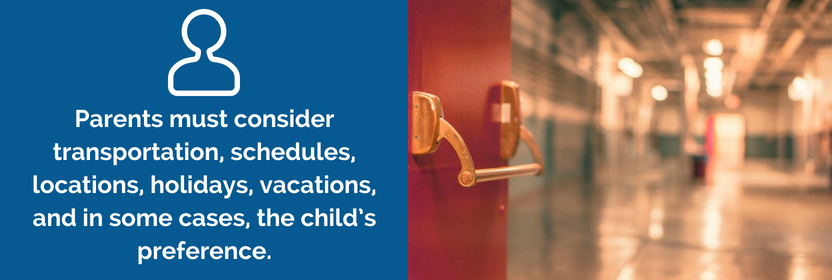It’s a sad truth that divorce is always hardest on the children, but when parents can settle their differences voluntarily and by mutual agreement, a divorce can be just a little smoother for everyone who is involved.
You are about to learn one of the ways that divorcing parents – or parents who have never married – resolve their differences regarding child custody in the state of California.
Of course, in any child custody case here in southern California, a parent must have the advice and services of a child custody attorney.
Child custody disputes in this state are almost always settled through private, out-of-court negotiations or through a more formal procedure – mediation.
What Happens If Parents Cannot Agree Regarding Child Custody?
If a child custody dispute cannot be settled voluntarily, privately, and outside of the courtroom by the parents, a resolution may be imposed by the court.
In any child custody dispute in this state, mediation is the mandatory first step. In fact, mediation is used by California courts to resolve most child custody and visitation disputes.
You will very much need an attorney’s help with a California child custody mediation.
The mediation process involves a lot more than merely sitting at a table and answering a few questions from attorneys.
What Does The Mediation Process Require?
Child custody mediation requires the full participation, interest, and attention of each parent.
It can sometimes take some flexibility and ingenuity to resolve a child custody conflict through the mediation process, and the mediator is not going to resolve the dispute alone. Both parents must be active in the process,
Most child custody mediators in the state of California are skilled family law attorneys who have completed special mediation training.
Unlike an arbitrator or a family law judge, a mediator does not make final child custody determinations. Instead, mediators help divorcing parents reach their own agreements regarding child custody.
Both parents will need to participate actively, cooperatively, and open-mindedly in the child custody mediation process.
How Can A Parent Best Prepare For A Custody Mediation?
These are the steps that a parent should take to prepare for the child custody mediation process:
1. Obtain a family law attorney’s insights and advice. You should fully understand your rights and your obligations before you walk into a child custody mediation.
2. Create your own written parenting plan. The more details you can provide regarding schedules, transportation, and so forth, the better. Your lawyer can advise and help.
3. Compile all of the pertinent documents and paperwork: your child’s report cards, medical records, and any other important information.
Exactly What Happens In A Child Custody Mediation?
Here is what happens in a child custody mediation in California:
1. The parents meet with the mediator.
2. The parents and mediator define the issues and disagreements.
3. The parents and mediator discuss possible solutions with an open, cooperative attitude.
4. The parents achieve, write, and sign a custody agreement.
How much time does the mediation process take? That will hinge on the complexities facing the parents and their willingness to work together throughout the mediation process.
Parents should be willing to listen to one another and to make some compromises during mediation.
What Must Be The Focus Of A Child Custody Mediation?
Mediation is not the right time or place to re-fight the past. Instead, a mediation session should focus on the child, the child’s future, and the child’s best interests.
With very narrow exceptions, anything that is said in a mediation session remains confidential and may not be used against you in court.
Precisely What Is The Mediator’s Role?
The mediator cannot give legal advice. The only role of the mediator is to facilitate the process and help parents resolve the custody dispute.
After an introductory meeting, a mediator then helps the parents to determine what the precise issues are that must be settled.
Mediators generally encourage parents to wrestle with the easier issues first. A little success early in the process helps to move the mediation in the right direction.
For mediation to work, each parent should discuss frankly and candidly their concerns and what they believe is fair.
But parents must also be willing to listen to the other side in a child custody mediation, and they should always make the best interests of the child their top priority in the process.
What Does A Parenting Plan Need To Include?
The end result of the child custody mediation process should be a parenting plan that:
1. designates the child’s primary residence
2. specifies each parent’s duties and obligations
3. maintains the child’s daily life and activities with minimal disruption
4. is consistent with the child’s long-term best interests
At the conclusion of the mediation, the mediator will help the parents prepare the written child custody agreement. The parents need to review it carefully. It is a legally binding contract.
The written child custody agreement should accurately reflect your understanding of the child custody agreement. Ask your attorney to review the agreement before you sign it.
The final written and signed child custody agreement will then be sent to the court for final approval by a judge.
What If Mediation Fails?
In the state of California, when the child custody mediation process fails because the parents cannot agree regarding a parenting plan, a judge will impose a plan based on:
1. the child’s psychological, physical, and emotional needs
2. each parent’s willingness to cooperate and openly discuss decisions regarding the child
3. each parent’s part in the child’s life before the divorce
4. each parent’s willingness to facilitate and promote a positive relationship between the child and the other parent
5. the child’s preferences
6. the best long-term interests of the child
How Can A Custody Trial Be Avoided?
Resolving a child custody dispute is never an easy process. In fact, for some parents, it is emotionally quite painful. Parents must consider transportation, schedules, locations, holidays, vacations, and in some cases, the child’s preference.
But if both parents can agree that their child comes first, with the help of a mediator and an experienced Long Beach family law attorney, parents can settle their differences reasonably, fairly, and without the need for a child custody trial.


 Call Us Now
Call Us Now Email Us Now
Email Us Now







